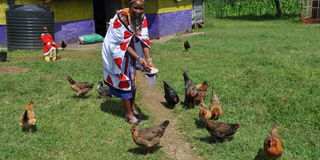Fistula patients suffer in silence amid Covid-19

What you need to know:
- Many obstetric fistula patients shying away from treatment in the wake of the Covid-19 pandemic.
- Obstetric fistula the most devastating childbirth injuries.
- Fistula Foundation asks patients to come forward and receive free treatment from their outreach centres across the country.
- Men asked to support women suffering from the condition, instead of ostracising them.
Stakeholders in the healthcare sector have raised concern over the high number of obstetric fistula patients shying away from treatment in the wake of the Covid-19 pandemic.
They said patients fear contracting the virus, forcing those with obstetric fistula – a childbirth-related injury caused by prolonged and obstructed labour – to suffer in silence.
“The Covid-19 pandemic has made people hesitant to be in public spaces including seeking healthcare services. Patients of obstetric fistula have not been spared either,” said Fistula Foundation Programs Director Habiba Mohamed.
Speaking to the Nation gender desk, Ms Habiba who doubles as the Patron of Wadadia FC alias ‘Kick Fistula out of Africa’ termed obstetric fistula as the most devastating and serious of childbirth injuries.
“Ours is to advocate for the sexual reproductive health rights and socio-economic well-being of the obstetric fistula patients so that they are able to recover their self-esteem and fit in the society. They should, therefore, not shy away from coming forward to receive treatment which is free of charge in all our outreach centres,” explained Ms Habiba.
FISTULA FOUNDATION
Mr Nelson Musa, also from Fistula Foundation, said their aim is to end fistula which has a devastating impact on affected women and their families.
“We are appealing to all patients of obstetric fistula to come forward and receive free treatment courtesy of Fistula Foundation which has outreach centres in most parts of the country,” said Mr Musa.
“At Fistula Foundation, we are aware that there are victims of obstetric fistula following the outbreak of coronavirus but we urge them to come forward because we are happy to help them heal both physically and mentally from the stigma associated with obstetric fistula.”
The duo was speaking during an event held at the Narok County Referral Hospital recently, to mark the International Fistula Day.
This year’s theme is "End gender inequality! End health inequities! End Fistula now!"
Women have been urged to avoid early marriages, early pregnancies and Female Genital Mutilation (FGM) to prevent them from suffering from obstetric fistula.
Dr Francis Otulo, a gynaecologist and specialist in correcting fistula at the Narok County Referral Hospital said the concern about Covid-19 should not cause anyone to be too afraid to seek care at a hospital.
“No one should delay care for obstetric fistula and other illnesses because they are too afraid of Covid-19. Delay of care could result in poorer overall health outcomes and even life-threatening situations,” explained Dr Otulo.
A fistula patient, Mrs Jane Manang'oi from Ntulele, urged those suffering from the condition to seek treatment.
STIGMA
“I developed the condition 22 years ago while expecting twins. I got help and support through Fistula Foundation and I am back on my feet meaning that the condition is treatable,” said the mother of four.
Ms Susan Keshe from Tipis, who is recuperating at the Narok County Referral Hospital after undergoing a successful obstetric fistula operation, expressed optimism that life will get back to normal after recovery.
“I have been battling this condition for almost one year now but after the operation I am optimist that I will get better. No woman should shy away from treatment of obstetric fistula,” said the 21-year-old.
In the nearby ward was 42-year old Everlynne Shani, a mother of eight from Trans Mara who said she developed obstetric fistula after giving birth to her third child.
She also lauded her husband for supporting her despite the stigma.
“Any woman out there with fistula should seek treatment. The second fistula condition has been with me for past two years while the first one lasted about 23 years. I now feel better after undergoing the surgery,” said Ms Shani.
Her husband, Mr Wilson Shani, urged men to support women suffering from the condition, instead of ostracising them.
Despite prevention efforts and free treatment of obstetric fistula, many women in the country delay seeking treatment and continue to live with fistula due to the stigma associated with it.
The condition, health officials say, can largely be avoided by delaying childbirth; the cessation of harmful traditional practices; and timely access to obstetric care.




